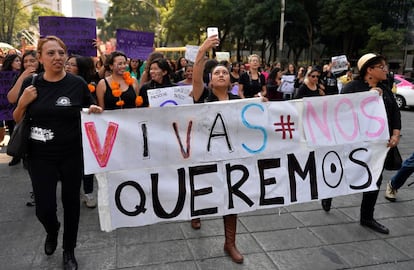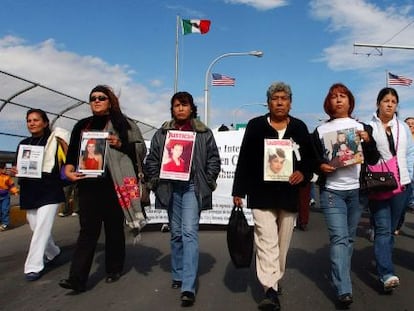Mexican deputies toughen up femicide legislation
Lower house passes reform to place suspects in pre-trial detention and prevent them from fleeing justice
Mexico¡¯s Chamber of Deputies has approved a reform to make femicide a serious crime meriting preventive prison. Under current legislation, a suspect may be released pending trial, creating a risk for witnesses and other potential victims, according to human rights groups.

The reform to Section 167 of the National Penal Procedures Code seeks to ensure that defendants will appear in court instead of fleeing justice. The initiative will now move to the Senate for debate.
Mexico¡¯s response to violence against women is still deficient, which leads to a lack of faith in the authorities, said Deputy Claudia Anaya Mota, who introduced the initiative in the lower house of Mexico¡¯s Congress.
The National Observatory against Femicides estimates that 60% of female killings in the country go unpunished.
The municipality of Ecatepec, in the State of Mexico, is considered particularly dangerous
Mar¨ªa Eugenia Ocampo Bedolla, another federal deputy, said it is necessary to include femicides on the list of high-impact crimes deserving of pre-trial detention, as the killing of women has reached alarming rates in Mexico.
¡°The administration of justice has not adequately responded to violent crimes,¡± she said, adding that this creates ¡°an increase in insecurity for women.¡±
Femicides in Mexico made world headlines in 1993 due to a spate of cases in the border town of Ciudad Ju¨¢rez. But it was another 20 years before the country¡¯s penal code incorporated femicide as a crime.

In 2012, Congress approved prison sentences of 40 to 60 years for individuals found guilty of killing a woman for gender-related reasons. Federal authorities asked the states to adapt their own legislation to the new situation.
To date, the only state that has yet to incorporate femicide into its criminal code is Chihuahua ¨C which is home to Ciudad Ju¨¢rez. In 2015, the Senate¡¯s Gender Equality Committee told the Chihuaha State Assembly to incorporate the crime into its code, but the change has yet to happen.
In 2009, the Inter-American Court of Human Rights ruled against Mexico for its inability to guarantee women¡¯s right to life. The historical ruling involved three women who had been murdered in Ciudad Ju¨¢rez in 1993, and found that Mexico had obstructed families¡¯ access to justice.
These days, human rights groups are particularly concerned about another part of the country: the state of Mexico, where 2,318 women have been murdered over the course of nine years, according to the watchdog group National Citizen Femicide Observatory (OCNF). The municipality of Ecatepec is considered particularly dangerous: around 600 women were killed there between 2012 and 2016.
English version by Susana Urra.
Tu suscripci¨®n se est¨¢ usando en otro dispositivo
?Quieres a?adir otro usuario a tu suscripci¨®n?
Si contin¨²as leyendo en este dispositivo, no se podr¨¢ leer en el otro.
FlechaTu suscripci¨®n se est¨¢ usando en otro dispositivo y solo puedes acceder a EL PA?S desde un dispositivo a la vez.
Si quieres compartir tu cuenta, cambia tu suscripci¨®n a la modalidad Premium, as¨ª podr¨¢s a?adir otro usuario. Cada uno acceder¨¢ con su propia cuenta de email, lo que os permitir¨¢ personalizar vuestra experiencia en EL PA?S.
En el caso de no saber qui¨¦n est¨¢ usando tu cuenta, te recomendamos cambiar tu contrase?a aqu¨ª.
Si decides continuar compartiendo tu cuenta, este mensaje se mostrar¨¢ en tu dispositivo y en el de la otra persona que est¨¢ usando tu cuenta de forma indefinida, afectando a tu experiencia de lectura. Puedes consultar aqu¨ª los t¨¦rminos y condiciones de la suscripci¨®n digital.










































